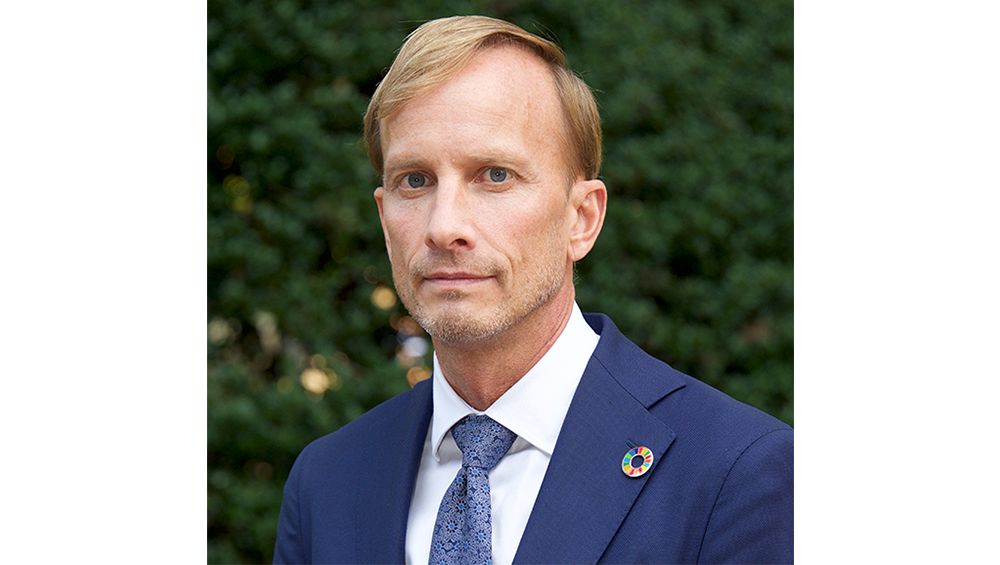Georgetown’s Mark Dybul Named to Independent Panel Examining WHO’s Response to COVID-19

Posted in News Release | Tagged Center for Global Health Practice and Impact, COVID-19, global health, pandemic, public health
Media Contact
Karen Teber
km463@georgetown.edu
WASHINGTON (September 3, 2020) — Ambassador Mark Dybul, MD, professor of medicine at Georgetown University Medical Center and co-director of its Center for Global Health Practice and Impact, has been named to a prestigious panel tasked with examining the World Health Organization’s response to the COVID-19 pandemic.
The co-chairs for The Independent Panel for Pandemic Preparedness and Response, former President of Liberia, Her Excellency Ellen Johnson Sirleaf and the former Prime Minister of New Zealand, the Rt. Hon. Helen Clark, announced the selection of Dybul and the other panelists during a press briefing Sept. 3.
“Today, we are pleased to present 11 excellent panelists representing a wealth of experience from health and broader societal perspectives,” said Johnson Sirleaf in a press release issued by The Independent Panel. “We look forward to intense work together at a key moment in history. In order to honour the more than 25.6 million people who have fallen ill, and more than 850,000 who have died due to COVID-19, we have no time to waste.”
“I look forward to working with this experienced, diverse and independent group led by her excellency, President Sirleaf and the Honorable Helen Clark,” said Dybul.
For nearly three decades, Dybul’s focus has been on the HIV pandemic — as a clinician, scientist, teacher and administrator.
He graduated from Georgetown in 1985 and earned his MD at Georgetown’s School of Medicine in 1992. He began his work in HIV research as a fellow at the National Institute for Allergy and Infectious Diseases under the direction of its director, Anthony Fauci, MD. In 2006, he was named U.S. Global AIDS Coordinator and led the implementation of the President’s Emergency Plan for AIDS Relief (PEPFAR), a health initiative he also helped create. Dybul later became the inaugural Global Health Fellow of the George W. Bush Institute. In 2013, he was named executive director of the Global Fund to Fight AIDS, Tuberculosis and Malaria.
The Independent Panel will hold its first meeting on Sept. 17, 2020. Following that, it is expected to seek evidence and views from a broad range of stakeholders including World Health Organization (WHO) Member States, health experts, economists, specialists on the social impacts of the pandemic, and individuals from civil society, the private sector and from the general public.
On Dec. 31, 2019, the WHO China Country Office was informed of cases of pneumonia of unknown etiology (unknown cause) detected in Wuhan City, Hubei Province of China. In the weeks that followed, the WHO received additional reports of disease from other countries. Initially, the disease was named 2019-nCoV. On Jan. 30, WHO Director-General Dr. Tedros Adhanom Ghebreyesus, on the recommendation of the Emergency Committee, declared the 2019-nCoV acute respiratory disease outbreak that began in Wuhan, China, a Public Health Emergency of International Concern.
“In the course of this year, COVID-19 has spread around the world, impacting in one way or another on the lives of every person on our planet,” said Clark in a press release for The Independent Panel. “We intend to learn all that we can about its early emergence, global spread, health, economic and social impacts, and how it has been controlled and mitigated. The Panel’s recommendations will aim to support effective management of the pandemic and strengthen how the world can prepare for and respond to future pandemics.”
The co-chairs were appointed by the WHO Director-General to lead an impartial, independent and comprehensive evaluation of the international health response to COVID-19 coordinated by WHO, in accordance with the request in a resolution at the 73rd World Health Assembly.
The panel is expected to submit their report to the 74th World Health Assembly in May 2021.
